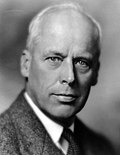Results
Walker won with a plurality of 497,165 votes, which had been the largest ever recorded for a mayoral candidate up to that time. [2] This record would stand for more than five years, being surpassed when the 1935 Chicago mayoral election was won by a plurality of 631,579. [5]
Walker won the absolute majority of votes in all five boroughs. The results were part of a larger Democratic landslide in which Democrats won the position of President of the Board of Aldermen, Comptroller, all positions in Brooklyn, and all Borough Presidencies except Queens, and gained 2 seats in the Assembly and 3 in the Board of Aldermen from Republicans. [2] Thomas's results were the highest recorded by the Socialist party to that date. [2]




